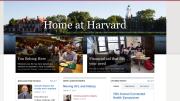A new initiative—The Harvard College Connection—will use social media, video, and other web-based communications, including a website, to encourage academically talented students from lower-income backgrounds to attend and complete college, whether at Harvard or at other selective institutions, University officials announced today.
“To ensure that talented low-income students understand their opportunities, we need to meet them where they are,” Harvard College dean of admissions and financial aid William R. Fitzsimmons said in a press release. “To date, that has meant literally traveling to meet them in cities and towns across the nation. Going forward, we will meet them both in person and online.”
The Harvard College Connection will launch this fall with a new admissions-office video featuring actor and writer Matt Damon ’92, New York Times columnist Nicholas Kristof ’82, and NBA player Jeremy Lin ’10. Officials noted in a press release that research has demonstrated first, that the students targeted by the video often attend high schools that do not provide adequate college counseling, and second, that relatively inexpensive interventions—such as text messaging and Facebook—can help increase college attendance.
“We still have much to learn about how to use the power of social media in encouraging greater access to higher education,” chief digital officer Perry Hewitt said in the press release. “Certain media may work better with some students than others—and we may also find that some ‘old-fashioned’ outreach such as mail, telephone calls, and travel is more effective—or can be enhanced by new approaches.”
According to University officials, the initiative’s primary focus is to increase college matriculation and graduation rates nationally for low-income students. (Currently, approximately 60 percent of Harvard College students receive need-based financial aid, with families receiving an average of $40,000 per year.) “Too many of our nation’s outstanding students, particularly those from modest economic backgrounds, fail to attend college or ‘undermatch’ themselves by not considering selective colleges where their chances of graduation would be better,” said Fitzsimmons. “America’s stature among the world’s leading nations will be greatly diminished in future generations if we do not reverse this trend.”









